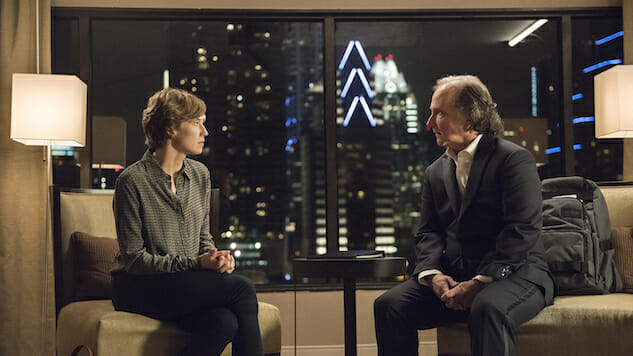The Leftovers: “Guest,” Again
(Episode 3.02)
Van Redin/HBO
“We need to talk about Nora.” So begins my recap of “Guest,” the finest hour in The Leftovers’ first season, and the phrase still rings as I intended: Nora Durst (Carrie Coon), whose husband and two sons departed from the kitchen table as she lost what was left of her patience, always compels one’s attention, her hardened shell cracking and chipping despite her near-constant repairs. In Coon’s hands, in the wild and surprising “Don’t Be Ridiculous,” the fact that time passes is no comfort; hers remains one of the medium’s most piercing performances because Coon clings, as if to a life preserver in stormy seas, to Nora’s enduring grief. With repeated reference to “Guest” — the self-harm, the hotel, the flashes of sorrow and rage — “Don’t Be Ridiculous” circles the series’ center, its acknowledgement that the construction of a calm façade is no less an “elaborate coping mechanism” than the obsession with death, the belief in rare forms of radiation, the emulation of Jesus. “You know what the odds of that are?” Perfect Strangers’ Mark Linn-Baker asks, his reference to being the one left behind in a tight-knit quartet the episode’s clearest connection to “Guest.” “One in 128,000,” she replies, as she has before. We need to talk about Nora, still, because Nora knows the score.
From the first note of the title sequence, set to Perfect Strangers’s main theme, The Leftovers turns to the unexpected, the ironic, even the bleakly funny to formulate its radical vision of grief’s grip, the way it barrels out of the past without warning. It looms so large, in fact, that it requires only the tiniest space to squeeze into the mind, an effect mimicked by those fleeting inserts from Nora’s former life: Her boys climbing into bed on some sun-splashed morning, the empty chairs they’d occupied only moments earlier, young Lily cradled in her arms. When her brother, Matt (Christopher Eccleston), tries to pretend that he’s telling the truth about the man on the pillar, for instance, it sets off a memory of the night their parents died; a broken kiosk at the Austin airport, ascertaining if she’s traveling with an infant on her lap, sends her thoughts toward the child that is no longer hers. That “Don’t Be Ridiculous” animates Nora’s arc with unpredictable cues (“Hallelujah, I’m a Bum,” the Wu-Tang Clan, Meet Me in St. Louis) at once softens these blows and underlines their swift, startling nature, and the result is an almost unbearable portrait of grief that’s nonetheless honest, and wise. Is it not the case that mourning doesn’t quite cease, so much as catch us off guard? That it becomes intermittent, abrupt, too draining to sustain but too closely held to give up completely?
In this sense, the episode’s link to “Guest,” in which Nora finds relief in a few days of anonymity, is one of refraction as much as reflection: Its focus turns, in stretches, to fresher wounds, as if to suggest that life’s tragedies are cumulative. When she receives Linn-Baker’s cryptic call, for example, his mention of her departed sons grabs her attention, but it’s his location, St. Louis—within driving distance of Lily’s new home in Eminence, Kentucky—that spurs her to action: To dig beneath her steely exterior is to unearth more than one loss, each one reshaping her reaction to those that came before. “Don’t Be Ridiculous” is too thorny, too fierce, to suggest that all losses are the same—see Erika’s (Regina King) reference to burying Evie as a form of closure—but it nonetheless offers a poignant acknowledgement that the shape of the hole it leaves in the living is similar in each case. For Nora, for Erika, for Mark Linn-Baker, the fundamental feature of loss, its awful skeleton, is its seeming capriciousness, which the nature of grief then mirrors: “What happened was arbitrary,” Linn-Baker says, after Nora remarks that he may be suicidal. “It was purposeless. It wasn’t my fault. I didn’t do anything to deserve this. So, no, Nora, I don’t want to kill myself. I want to take some fuckin’ control.”
-

-

-

-

-

-

-

-

-

-

-

-

-

-

-

-

-

-

-

-

-

-

-

-

-

-

-

-

-

-

-

-

-

-

-

-

-

-

-

-








































